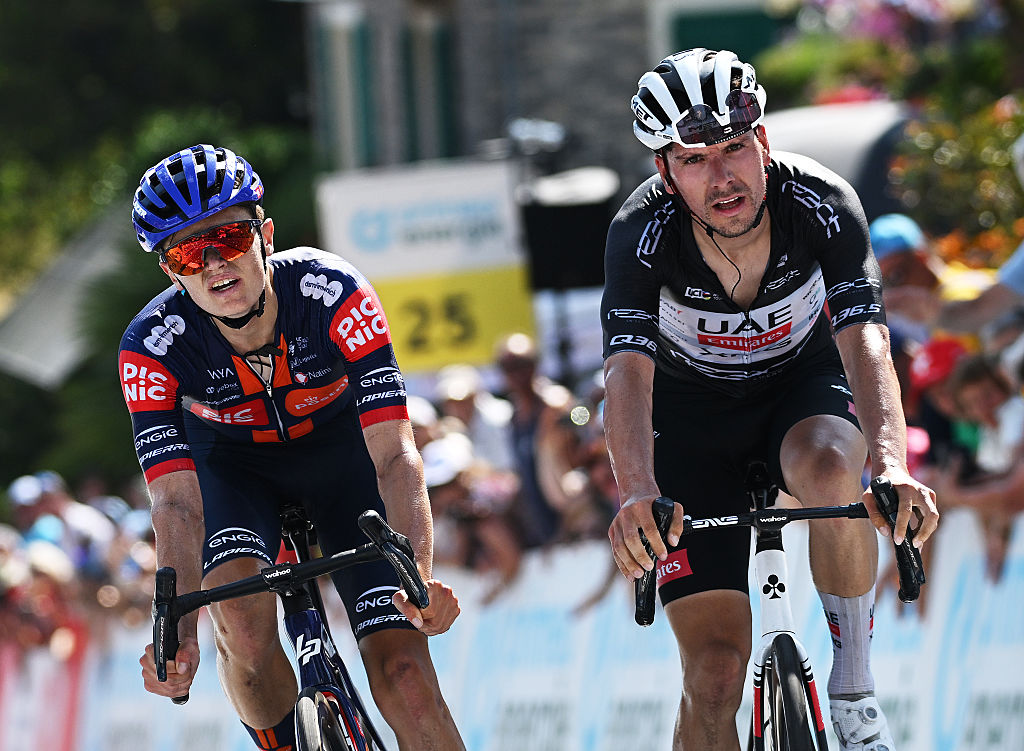'It is our time to show them what we can do' - World Championships make history in Rwanda but UCI can still do far more to develop African cycling
Athletes share experiences, reflect on successes and barriers amid hopes of a turning point for cycling in Africa
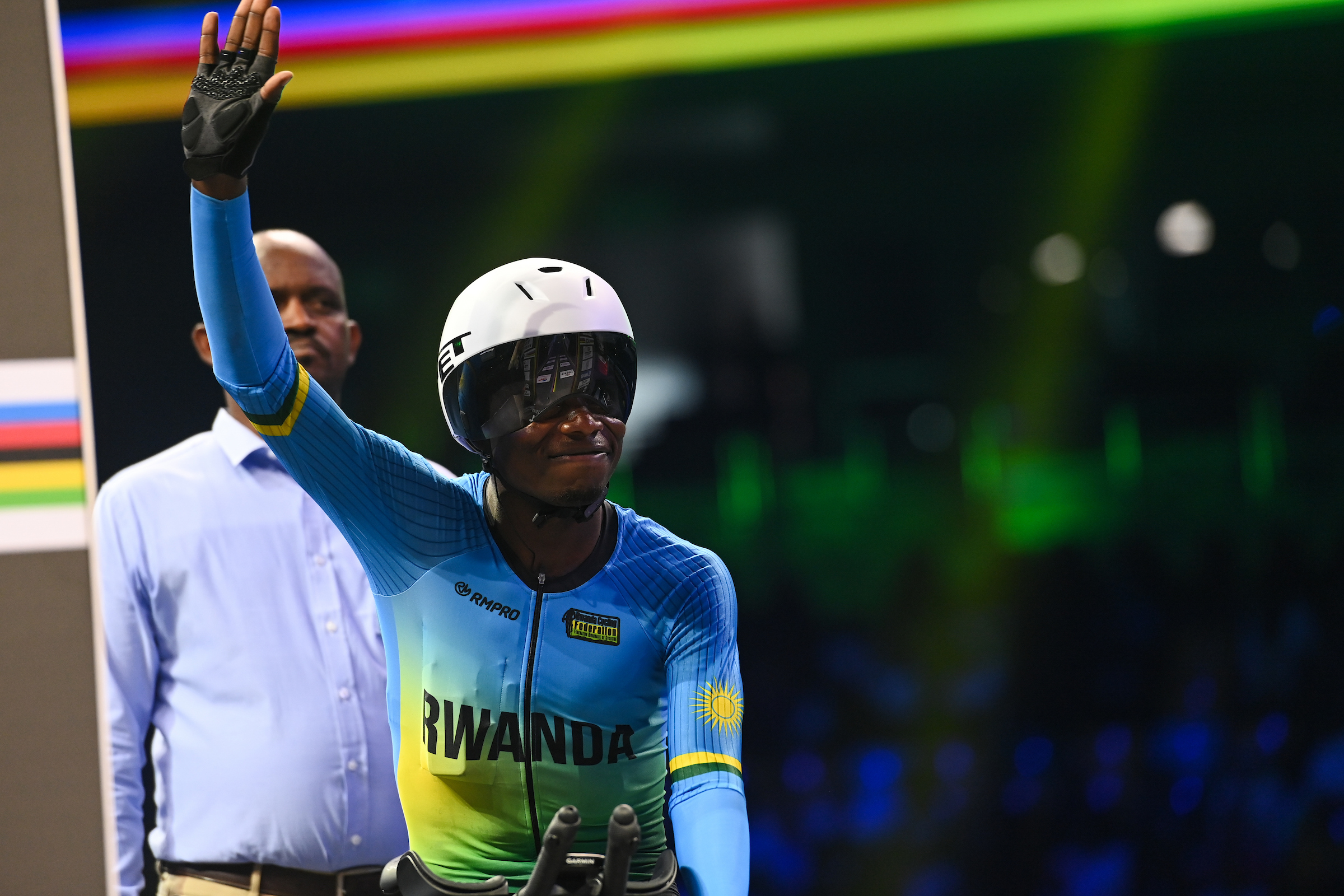
The latest race content, interviews, features, reviews and expert buying guides, direct to your inbox!
You are now subscribed
Your newsletter sign-up was successful
It's been more than a century since the inaugural UCI Road World Championships, with the majority of them having been held across Europe and on rare occasions reaching North America, South America, Asia and Oceania. However, this edition of the sport's centrepiece event has finally reached Africa in what has become a landmark moment that will undoubtedly be remembered as among the first steps toward the long-time promise of a truly global sport that is for everyone.
Television footage and photography have showcased a vibrant atmosphere and massive crowds lining the streets of Kigali. There is singing, cheering and waving of the flags of roughly 108 nations; 36 of those from Africa, and none more prominent than the blue, yellow, and green of Rwanda.
In just the first two days of racing, UCI President David Lappartient has highlighted the historic importance of these World Championships in both location and scale, illustrating the appeal of road cycling beyond Europe for National Federations and African riders.
The continent has produced some of the top cyclists, past and present, including Biniam Girmay, Natnael Tesfatsion, Merhawi Kudus and Daniel Teklehaimanot (all from Eritrea), Tsgabu Grmay (Ethiopia), Djazilla Umwamikazi and Xaverine Nirere (Rwanda), Ashleigh Moolman Pasio, Daryl Impey, Louis Meintjes and Robbie Hunter (all from South Africa), Ahmed Kebaili (Algeria), and Kim Le Court-Pienaar (Mauritius).
Cyclingnews is on the ground at the World Championships and has spoken to some of the many talented athletes competing for African nations in Kigali. All expressed their pride in both hosting and participating in the individual time trials, mixed team relay and road races across eight days of world-class racing.
They also emphasized the barriers they have faced, the need for more investment along with high-level training and racing opportunities, and have called on the sport's governing body to increase its action in developing cycling in Africa.
"Keep on inviting the African countries and riders to come together to train" - Namukasa Trinitah
The UCI has made a two-decade-long promise to globalise cycling and has taken steps in that direction through its World Cycling Centre (WCC) programme that supported athletes worldwide. With a home-base at the headquarters in Aigle, Switzerland, it has provided opportunities for athletes to learn and excel in the five Olympic disciplines of road, track, BMX Racing, BMX Freestyle and mountain bike, while also developing cycling locally and internationally.
The latest race content, interviews, features, reviews and expert buying guides, direct to your inbox!
The talent identification process is carried out in collaboration with the five Continental Confederations. Athletes are spotted by their National Federations for cycling, especially in developing nations, if they have high-level training aptitude. The WCC then offers part and full scholarships, including a full range of equipment, lodging, meals, coaching and an opportunity to compete in top-level races.
In addition to providing training and racing opportunities out of Switzerland, there are satellite education programmes set up around the world that offer training, coaching, mechanics education and support.
Riders who have come through the WCC programme over the years include Girmay and Teklehaimanot, Trinidad and Tobago's Teniel Campbell and Kwesi Browne, and China's Guo Shuang.
New to the development programming ahead of the Rwanda World Championships was a WCC Regional Development Satellite in Rwanda, which operates out of three locations: Musanze, Bugesera and Rwamagana. These offer athlete and staff accommodations as well as classrooms for theory sessions, with an emphasis on road cycling development and training.
The new satellite location is one of two in Africa, the other is a WCC Continental Satellite in Paarl, South Africa and there are a total of nine of these around the world, including Anadia (Portugal), Bromont (Canada), Cambridge (New Zealand), Couva (Trinidad and Tobago), Lima (Peru), New Delhi (India), Shanghai (China) and Yeongju (Korea). There is one other Regional Development Satellite in Shuzenji (Japan).
"I am delighted by the part our country will play in the development of cyclists from Africa, who are able to enter Rwanda simply and free of charge," said President of the Rwanda Cycling Federation Samson Ndayishimiye at the time of the launch in February.
"Not all National Federations have the resources necessary to help their athletes realise their full potential, and that is where Rwanda's UCI WCC Regional Development Satellite will provide significant assistance. We look forward to welcoming the next generation of African cyclists and giving them a boost towards their elite cycling careers."
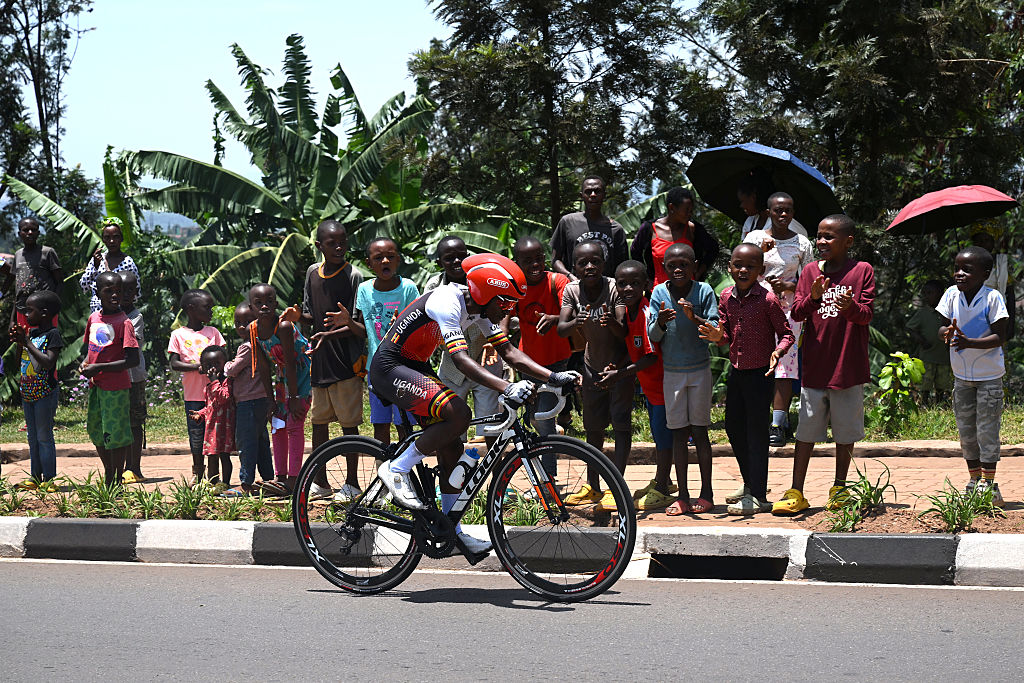
Ahead of the Rwanda Worlds, the WCC Regional Development Satellite in Rwanda hosted upwards of 20 athletes from nations across Africa in the junior, under-23 and elite categories for four weeks of training for those riders representing their nations in the races in Kigali.
Rwanda's road and gravel racer, Xaverine Nirere, also races for Team Amani based in Kenya, and she races primarily in Africa. She opened the Rwanda Worlds as the first rider down the ramp of the elite women's time trial, sitting in the hotseat until Italy's Soraya Paladin crossed the line with a faster time, and ultimately finishing 27th in the event where Marlen Reusser from Switzerland claimed the title.
"I'm so excited. It's more opportunity for African riders, and it is our time to show them what we can do and what we have as talent," Nirere said in an interview with Cyclingnews, explaining that she spent time training in Kigali for three weeks ahead of the event.
"We went to stay for a few weeks at the camp. We came here in Kigali to do the recon, too. There were women from the elite, under-23, and junior groups, with about nine women in each group. It was a hard camp. We did long rides and a higher level of training."
Opportunities to race at the highest level are limited in Africa, and Uganda's Namukasa Trinitah, who is also competing in the elite women's events at the Worlds, said she rarely has a chance to race in her country, there is not enough specialised coaching and that the terrain in her region wasn't ideal for her preparations for the Worlds.
She said participating in the pre-Worlds camp was an opportunity to improve her overall performance, not just at the Worlds, but for future races, too.
"I did the camp, one month in Rwanda. I enjoyed the new environment because we don't have these climbs in Uganda. Where I live, it is flat. We don't have a lot of climbs, and it was a big experience, new environment, how to climb, corner, it was a challenge, but I liked it," Trinitah said.
"I have a lot of new friends; though we don't all speak the same language, we tried to communicate and work together as a team. It was like being a team."
Trinitah has been racing for two years, competing in the African Championships, the Tour Cycliste International Feminin du Burundi and the Ugandan National Championships. She said she juggles her training sessions, about four days a week, with her full-time work as a primary school teacher, but hopes the sport governing body will continue to offer more training camps to African riders.
"I think they should keep on inviting the African countries and riders to come together to train us because, when we talk about Uganda, we don't have certified coaches, for example," Trinitah said.
"We have coaches, but some things they don't tell us. So there are things that we learn from the added training [camp] that have been really helpful for us. I hope they continue to give us these opportunities."
"It's not enough to only have a couple UCI races in Africa" - Biniam Girmay
The opportunities afforded by the WCC programming, however, only offset some of the barriers that African riders face in their pursuit of competitive road cycling.
The international calendar offers upwards of ten events on the Africa Tour for the men's peloton, including the more well-known Tour du Rwanda, and there are high-level national events like the Tour of Tigray in Ethiopia.
Girmay, a multiple-time Tour de France stage winner racing for Intermarché-Wanty and the silver medallist in the under-23 elite men's race at the 2021 Worlds in Leuven, believes that the UCI could be doing more when it develops athletes across Africa, and he thinks it starts with more races.
"It's not enough to only have a couple of UCI races in Africa; we need more local races, too. If you see some countries, they never race; only the national championships or Tour du Rwanda, so it doesn't help to grow," Girmay said.
"They need to work from the bottom. If you don't build from the bottom, you can't get to the top. They need to help the grassroots grow. I see the difference between European and other continents, that is the difference, you need to start at the bottom."
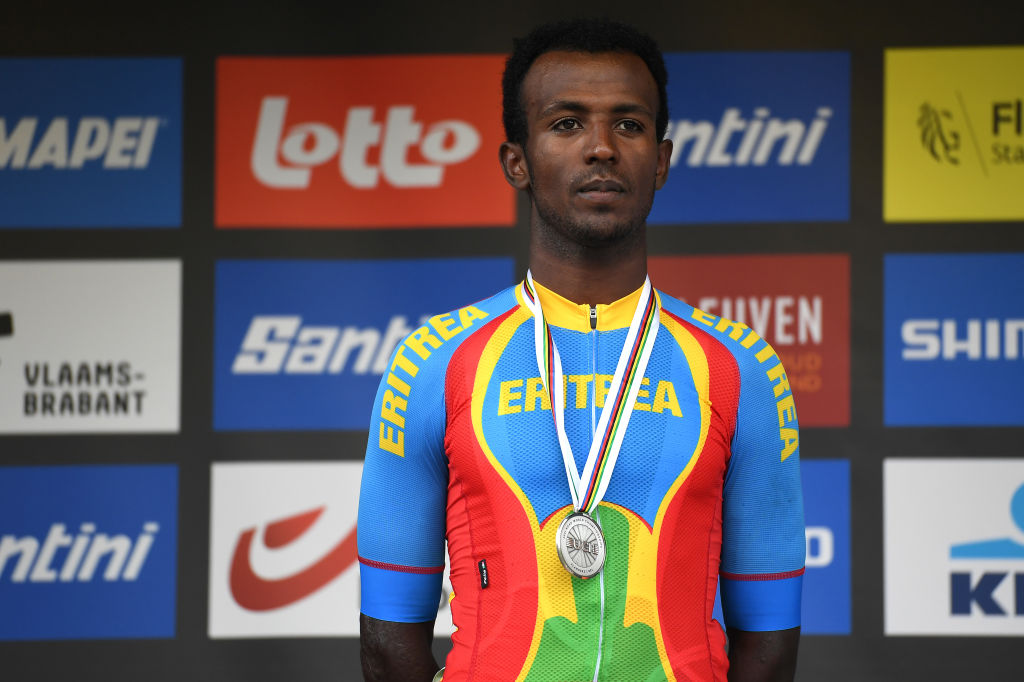
On the women's side, the African Championships and individual national championships make up much of the racing opportunities, in addition to a series of local-level women's races in each country.
The UCI 2.2 Pupkewitz Megabuild Windhoek Women Tour in Namibia, won by Nirere in August, and national events like the Tour Cycliste International Feminin du Burundi, Tour of Tigray in Ethiopia, Machakos Thigh Grinder in Kenya, and in gravel events like the Migration Gravel Race, along with varying numbers of local races across African nations, are a few of the opportunities offered to African women.
"They should support more races. I think it is because of the number of girls cycling as a sport in Africa ... it is not as much as the boys, but if we could inspire the girls, they are there," Trinitah said.
"There are women who want to race but might not have a bike, a kit or know where to start; it is a problem. But if we work upon that and see how we can support, and if we can get more support for that, then women's cycling in Africa can improve."
Kendra Tabu from Kenya, who also spends time with Team Amani, finished 37th in the individual time trial in Kigali. She was not part of the WCC training camp but agreed with Girmay and Trinitah, suggesting that while training camps and racing at bigger events are essential to gain experience in the peloton at higher-level races, it was just part of the picture.
"It would be useful, for the points, experience and exposure to increase the level," Tabu told Cyclingnews.
"I cannot say the development is good [in Kenya]. What we need more of is racing to improve the level. When you are only training, it is hard to know how you improve, and you cannot challenge at the best levels."
Nirere said that while she would like to see more higher-level men's and women's races in Africa on the international calendar, too, she would also like the UCI to promote more opportunities for African riders to compete in Europe.
"Give us more races in Africa and also the chance to go to Europe to do some of the big races. Those girls [the elite women who already compete in Europe] have many races like the Giro d'Italia and Tour de France. We do very few races in comparison, and sometimes only the African Championships. If we had the opportunity to go to do the bigger races, it would help us."
"A lot of work to be done to close the gap" - Ashleigh Moolman Pasio
Access to racing is just one of many barriers that African riders face, but Girmay and South Africa's Ashleigh Moolman-Pasio, who races for AG Insurance-Soudal, both say that professional cycling's focus on winning races and delivering a return on their investment in an athlete, plus visas and cultural differences are also obstacles.
"Bringing the World Championships to Africa is definitely a good opportunity, but there is still a big gap between the level of African riders and the highest level, so there is still a lot of work to be done to close the gap," Moolman Pasio told Cyclingnews.
She highlighted African programmes that are making a difference, like Team Amani, which is based in Kenya, but is developing riders from Kenya, Uganda, Rwanda, and Ethiopia. They are doing this through training camps at the Amani House in Iten as well as through racing both road and gravel events, providing opportunities for riders with limited access to infrastructure, equipment and racing abroad.
"There are so many reasons why it's very difficult; it's visas, as an African rider to get a work visa in Europe is pretty hard and that is one of the biggest challenges, and hence why teams like Team Amani, for example, are looking at creative ways to develop riders.
"It is also the experience of racing in Europe, the dynamics of racing and the tactics of racing. It's not that African riders don't have the talent, it's that they don't always have the means to pursue the 'marginal gains', of course, and that is where there is still a big gap."
Girmay said that it can be a sharp change for athletes in their first season of racing in Europe and that oftentimes it would be more helpful for teams to bring in riders on multiple-year contracts to allow for time to develop in a new environment, but he has little faith in professional cycling's hierarchy of teams which can often be more concerned with the business-side of racing than developing athletes outside of Europe.
"To be honest, to speak the truth, at the end of the day, everyone cares about the business. They don't want to wait two years or one year to give an opportunity to learn and to improve. No, now there is only time to win races. That is the big fear that I have," Girmay said.
"If you want to have someone come in from another country, you have to give them a year to learn ... the culture, and otherwise they will not, they have to live in Europe, adapt to the European life, or they can't perform. That is my fear; they [teams and managers] need to understand our situation.
"If you brought a rider from Europe to Eritrea, they would not be performing so strongly because they would be completely away from their [home], from family, they need to be mentally strong, also. It's not only about the legs.
"My closest manager wants to add young talent, but there isn't a lot of opportunity [to recruit athletes]; only the African Championships or National Championships, it is not easy to find the right moment. It's not easy to be in the culture, lifestyle; you need to give opportunity, spend time and money, and there are not a lot of people interested."
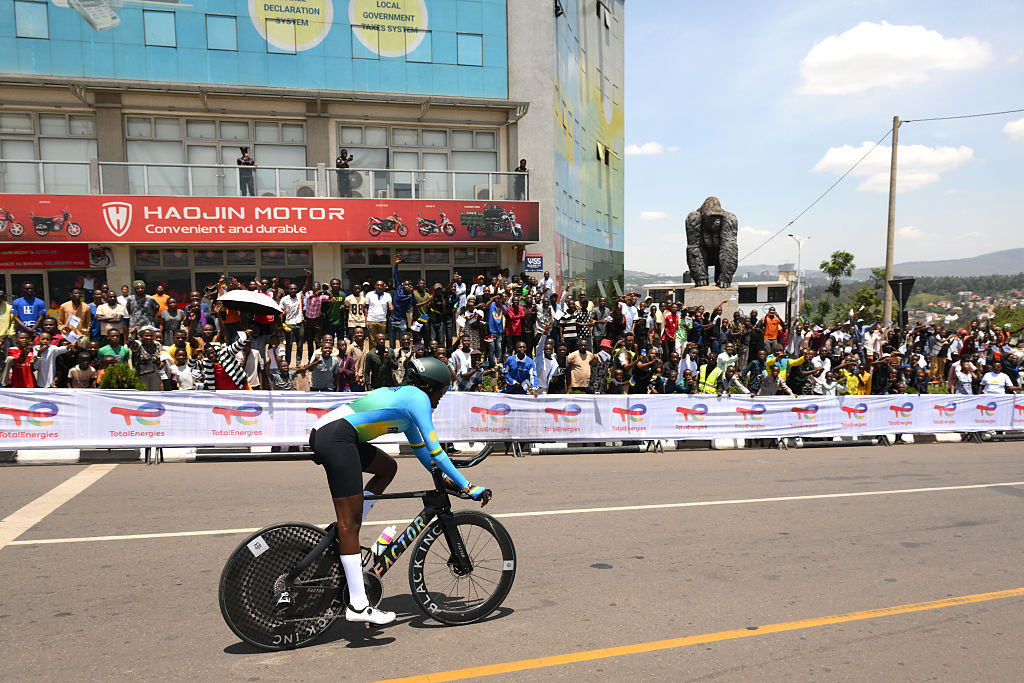
Girmay will be competing in the elite men's road race on Sunday. He believes that hosting the World Championships in Africa for the first time is historic and offers a massive opportunity for athletes to race against the best.
But while he was pleased that Rwanda is hosting this event, he also would have preferred a course design that offered an opportunity to more riders, likening the elite men's course to that of the Monument Liège-Bastogne-Liège. He said the route would not suit him and, in fact, would only suit select riders on the WorldTour.
"It is tough, and I don't know how many African riders will finish the race. That is not nice because this is the first time this event is in Africa; also, it is not nice to just go there and finish the race. It doesn't make sense, so, for me, it is different, but it is nice to have a big event on your continent and in your country. I would expect that this is also good for the younger generation and for Rwandan people because they are motivated to grow cycling, so it is good to host this event," Girmay said.
"It's always nice to have one symbol in your country, and at the end of the day, it is important to think about the future of cycling in Africa and Eritrea. It's nice to be there to represent and show them respect and to show them that it is possible if they give 100% and work hard - it is possible. From my side, it is nice to give people hope and to tell them that anything is possible."
Trinitah said that riders like Moolman-Pasio and Girmay have influenced her. "I am inspired. I'm also coming to love what I do more because I can see [from them] where we are going and that we have a chance - cycling is for everyone."
After competing at the Rwanda Worlds, she said that she envisions herself leaving Uganda to compete internationally, like Girmay, and while she understands that being away from her home and family would be difficult it's a chance she's willing to take.
"Of course, I think about it, but I have to admit that if I want a future in sport, I have to leave. My family has to understand, and they support me and wish me the best. All of that matters to me, but what also matters is getting something out of my sport. I want to inspire [my students]. If they have something that they want to do, I will inspire them and tell them to go for it - in any sport."
Subscribe to Cyclingnews to unlock unlimited access to our coverage of the first-ever UCI Road World Championships on African soil. Our team of journalists will bring you all the major storylines, in-depth analysis, and more directly from the action in Rwanda as the next rainbow jerseys are decided. Find out more.

Kirsten Frattini has been the Editor of Cyclingnews since December 2025, overseeing editorial operations and output across the brand and delivering quality, engaging content.
She manages global budgets, racing & events, production scheduling, and contributor commissions, collaborating across content sections and teams in the UK, Europe, North America, and Australia to ensure audience and subscription growth across the brand.
Kirsten has a background in Kinesiology and Health Science. She has been involved in cycling from the community and grassroots level to professional cycling's biggest races, reporting on the WorldTour, Spring Classics, Tours de France, World Championships and Olympic Games.
You must confirm your public display name before commenting
Please logout and then login again, you will then be prompted to enter your display name.
